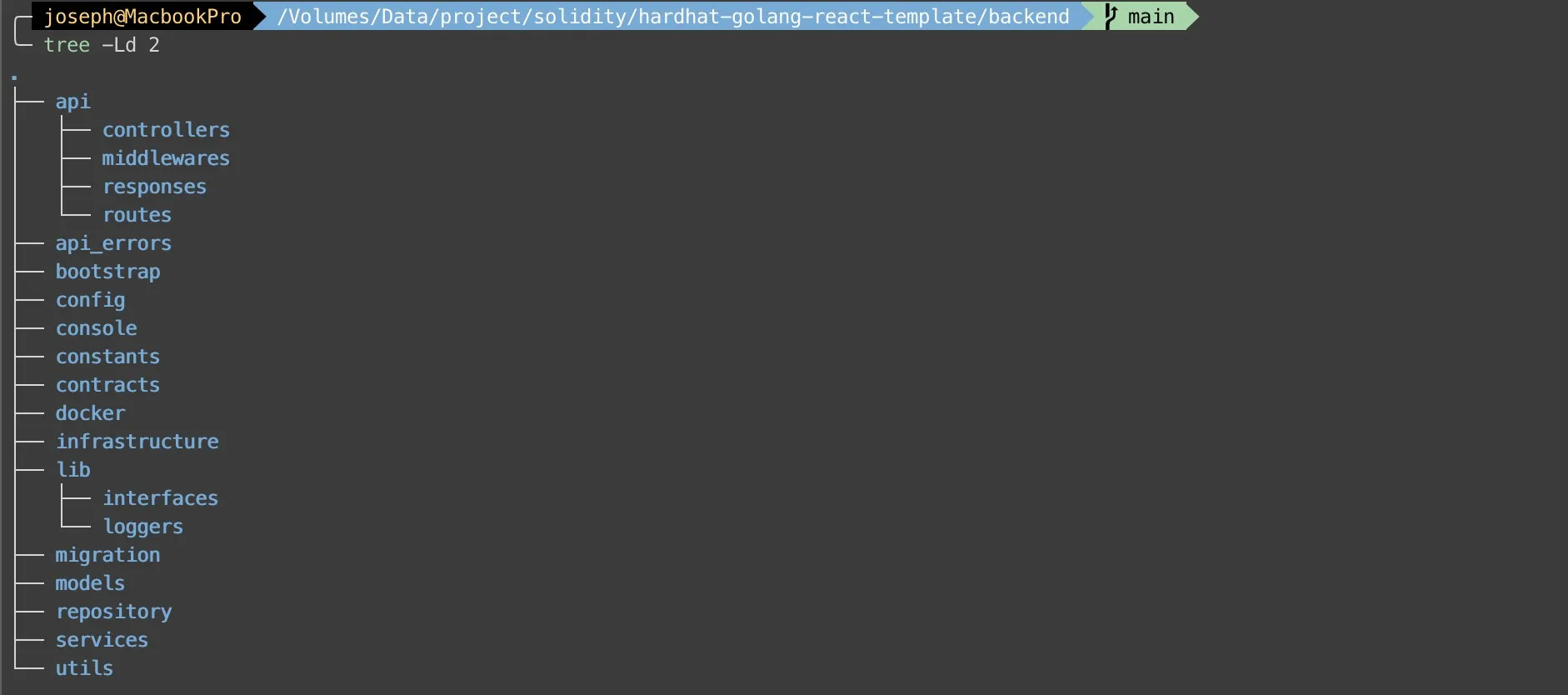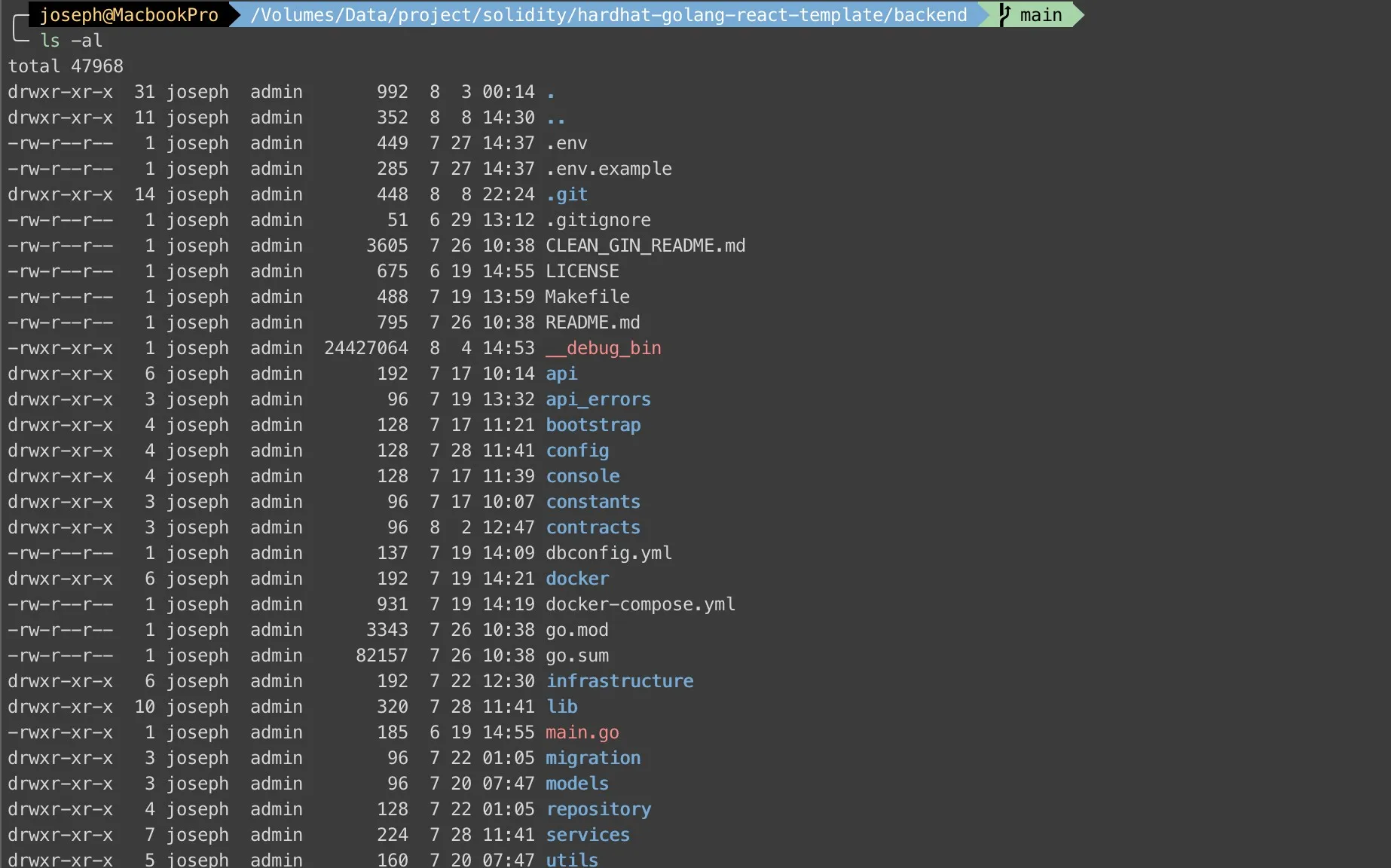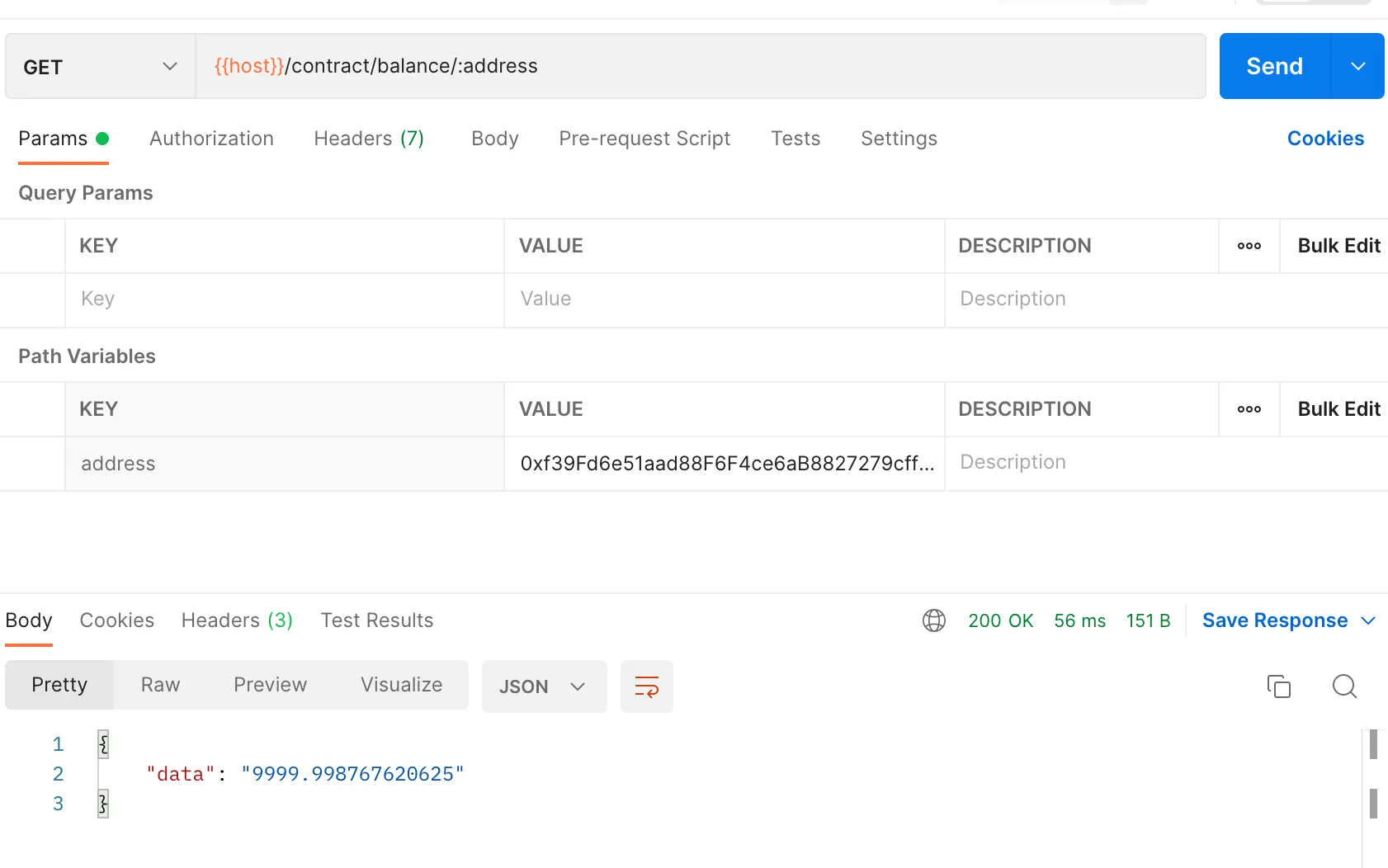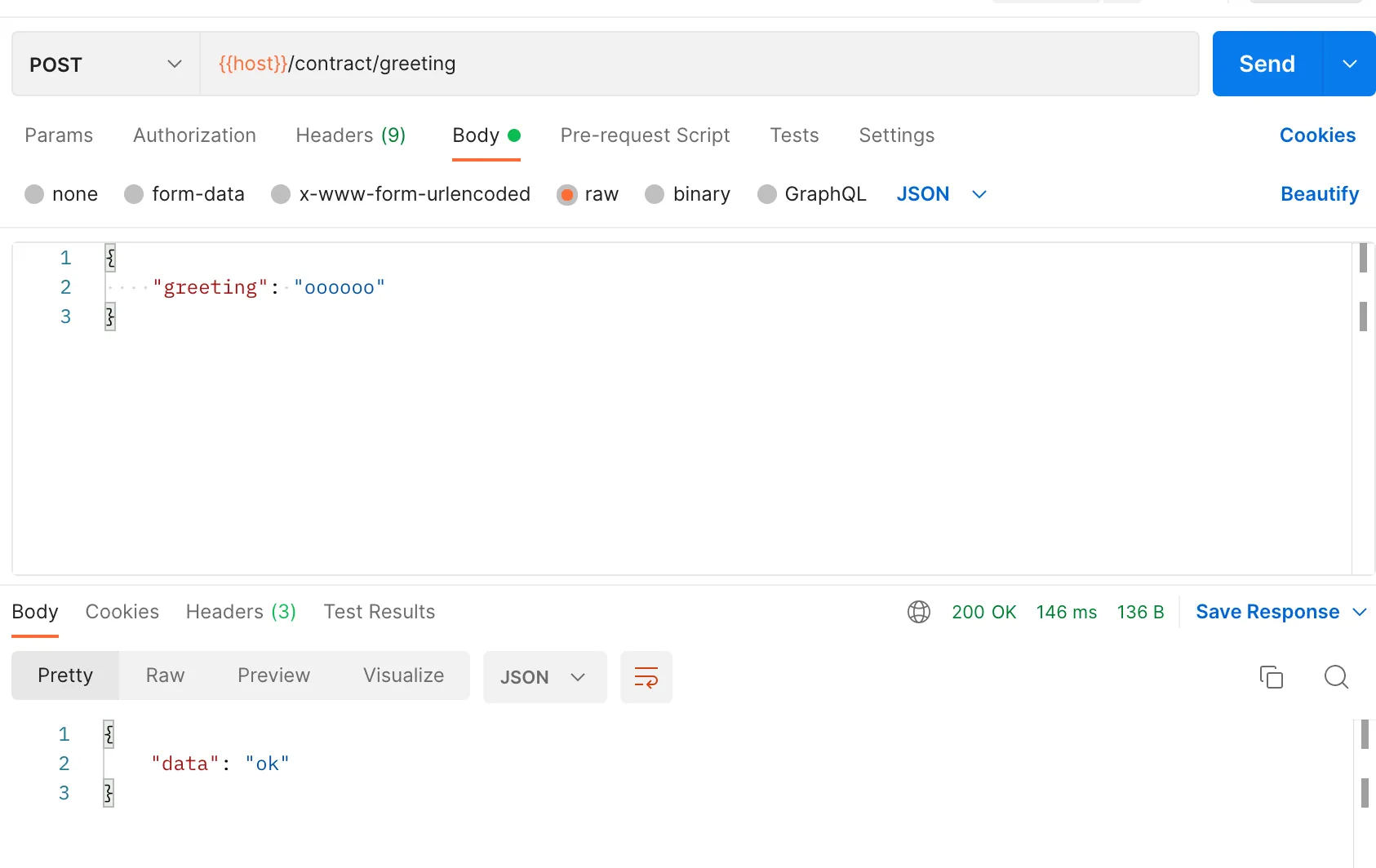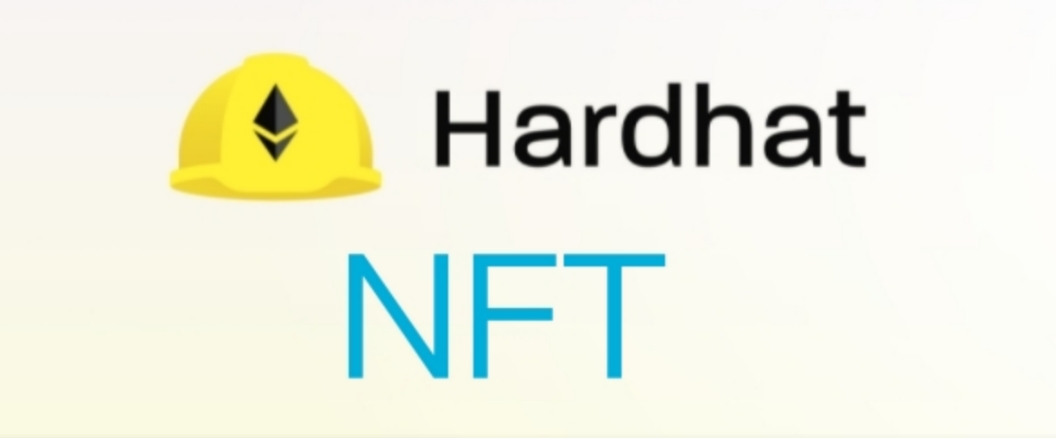Blockchain fullstack structure - Part 3 - Golang Gin

It’s time to Blockchain with Golang. If you haven’t seen my previous post Part 1 Introduction and Part 2 Hardhat, please read them first.
Again, does Dapp need a Backend?
- You can pretty much make a dapp without backend, but there are some things that can’t be done with a smart contract.
- You need a backend among other reasons for off-chain or metadata that won’t be stored in the smart contracts.
Have you ever thought about how Moralis works?
Off-chain: Backend infrastructure that collects data from the blockchain, offers an API to clients like web apps and mobile apps, indexes the blockchain, provides real-time alerts, coordinates events that are happening on different chains, handles the user life-cycle and so much more. Moralis Dapp is used in order to speed up the implementation of the off-chain infrastructure. Moralis Dapp is a bundled solution of all the features most Dapps need in order to get going as soon as possible.
Although I’m more familiar with Node.js and Ruby than Golang, I choose Golang Gin web framework to implement a backend, and use go-ethereum to communicate with blockchain. But I totally have no idea about organizing Golang/Gin file structure, Ruby on rails and Adonis / Node.js handles it very well. After some survey, I find a Go clean architechture repo. It file structure is similar to RoR and Adonis, and it integrates with Go Fx to make dependency injection easy. That’s why I use it in my backend project.
Files and Folder structure
Let me focus on DApp part, and just skip the folder structure introduction.
Docker
The Docker compose includes 3 services such as api, database, and adminer. There are many files so I hope you can go through the repo yourself.
Migration database
Check Makefile and migration first. It’s important to run migration in the beginning.
include .env
MIGRATE=docker-compose exec api sql-migrate
ifeq ($(p),host)
MIGRATE=sql-migrate
endif
migrate-status:
$(MIGRATE) status
migrate-up:
$(MIGRATE) up
migrate-down:
$(MIGRATE) down
redo:
@read -p "Are you sure to reapply the last migration? [y/n]" -n 1 -r; \
if [[ $$REPLY =~ ^[Yy] ]]; \
then \
$(MIGRATE) redo; \
fi
create:
@read -p "What is the name of migration?" NAME; \
${MIGRATE} new $$NAME
.PHONY: migrate-status migrate-up migrate-down redo createmigration/xxxxxxx-create_users_table.sql
-- +migrate Up
CREATE TABLE IF NOT EXISTS `users` (
`id` BINARY(16) NOT NULL,
`email` VARCHAR(100) NOT NULL,
`name` VARCHAR(20) NOT NULL,
`birthday` DATETIME,
`wallet_address` VARCHAR(42) NOT NULL,
`member_number` VARCHAR(100),
`created_at` DATETIME NOT NULL,
`updated_at` DATETIME NOT NULL,
PRIMARY KEY (`id`),
CONSTRAINT email_unique UNIQUE(email),
CONSTRAINT wallet_address_unique UNIQUE INDEX (wallet_address)
)ENGINE = InnoDB DEFAULT CHARSET=utf8mb4;
-- +migrate Down
DROP TABLE IF EXISTS `users`;The migration shows to create a users tables when migrate up, and I use the following command to run migration:
make migrate-up
Step 1: Authencation
Users need to sign up or sign in when they clicked the connect wallet button, so I add auth route and controller logics first.
api/routes/auth_route.go
package routes
import (
"hardhat-backend/api/controllers"
"hardhat-backend/infrastructure"
"hardhat-backend/lib/loggers"
)
// AuthRoutes struct
type AuthRoutes struct {
logger loggers.Logger
handler infrastructure.Router
authController controllers.JWTAuthController
}
// Setup user routes
func (s *AuthRoutes) Setup() {
s.logger.Info("Setting up routes")
auth := s.handler.Group("/api").Group("/auth")
{
auth.POST("/login", s.authController.SignIn)
}
}
// NewAuthRoutes creates new user controller
func NewAuthRoutes(
handler infrastructure.Router,
authController controllers.JWTAuthController,
logger loggers.Logger,
) *AuthRoutes {
return &AuthRoutes{
handler: handler,
logger: logger,
authController: authController,
}
}api/controllers/jwt_auth_controller.go
package controllers
import (
"hardhat-backend/api_errors"
"hardhat-backend/lib/loggers"
"hardhat-backend/services"
"hardhat-backend/utils"
"github.com/gin-gonic/gin"
)
// JWTAuthController struct
type JWTAuthController struct {
logger loggers.Logger
service services.JWTAuthService
userService *services.UserService
}
type SignInRequest struct {
WalletAddress string `json:"walletAddress"`
}
// NewJWTAuthController creates new controller
func NewJWTAuthController(
logger loggers.Logger,
service services.JWTAuthService,
userService *services.UserService,
) JWTAuthController {
return JWTAuthController{
logger: logger,
service: service,
userService: userService,
}
}
// SignIn signs in user
func (jwt JWTAuthController) SignIn(c *gin.Context) {
jwt.logger.Info("SignIn route called")
var request SignInRequest
err := c.BindJSON(&request)
if err != nil {
utils.HandleValidationError(jwt.logger, c, api_errors.ErrInvalidRequest)
return
}
walletAddress := request.WalletAddress
user, newUser, err := jwt.userService.GetOneUserByWalletAddress(walletAddress)
if err != nil {
utils.HandleError(jwt.logger, c, err)
return
}
// token := jwt.service.CreateToken(user)
c.JSON(200, gin.H{
"message": "logged in successfully",
"data": gin.H{
"user": user,
"newUser": newUser,
},
})
}services/user_service.go
...
// GetOneUserByWalletAddress find first or create a user by wallet address
func (s UserService) GetOneUserByWalletAddress(walletAddress string) (user models.User, newUser int64, err error) {
result := s.repository.FirstOrCreate(&user, models.User{WalletAddress: walletAddress})
return user, result.RowsAffected, result.Error
}
...The UserService called Gorm FirstOrCreate method to get the user by WalletAddress string. Hence the /api/auth/login endpoint can return the user to frontend.
Step 2: Sign-in with Ethereum (SIWE)
Sometimes, I need to verify the message from client, so I add SIWE controller to handle it.
I’m supposed to add an endpoint to get
nonce, but this versionnonceis generated from frontend.
api/routes/siwe_route.go
package routes
import (
"hardhat-backend/api/controllers"
"hardhat-backend/infrastructure"
"hardhat-backend/lib/loggers"
)
// SiweRoutes struct
type SiweRoutes struct {
logger loggers.Logger
handler infrastructure.Router
siweController controllers.SiweController
}
// Setup siwe routes
func (s *SiweRoutes) Setup() {
s.logger.Info("Setting up routes")
api := s.handler.Group("/api")
{
api.POST("/siwe/verify", s.siweController.PostVerify)
}
}
// NewSiweRoutes creates new siwe controller
func NewSiweRoutes(
handler infrastructure.Router,
logger loggers.Logger,
siweController controllers.SiweController,
) *SiweRoutes {
return &SiweRoutes{
handler: handler,
logger: logger,
siweController: siweController,
}
}api/controllers/siwe_controller.go
package controllers
import (
"hardhat-backend/api_errors"
"hardhat-backend/lib/loggers"
"hardhat-backend/services"
"hardhat-backend/utils"
"github.com/gin-gonic/gin"
)
// SiweController data type
type SiweController struct {
service *services.SiweService
logger loggers.Logger
}
type VerifyRequest struct {
Message string `json:"message"`
Signature string `json:"signature"`
}
// NewSiweController creates new siwe controller
func NewSiweController(siweService *services.SiweService, logger loggers.Logger) SiweController {
return SiweController{
service: siweService,
logger: logger,
}
}
// PostVerify verify message string
func (s SiweController) PostVerify(c *gin.Context) {
var request VerifyRequest
err := c.BindJSON(&request)
if err != nil {
utils.HandleValidationError(s.logger, c, api_errors.ErrInvalidRequest)
return
}
_, err = s.service.Verify(request.Message, request.Signature)
if err != nil {
utils.HandleError(s.logger, c, err)
return
}
c.JSON(200, gin.H{
"data": "Verified",
})
}In the SiweService, I install the Sign-In with Ethereum package siwe-go, which is the same package I used in Next.js frontend.
SIWE-go usage: https://docs.login.xyz/libraries/go
services/siwe_service.go
package services
import (
"hardhat-backend/lib/loggers"
siwe "github.com/spruceid/siwe-go"
)
// SiweService service layer
type SiweService struct {
logger loggers.Logger
}
// NewSiweService creates a new userservice
func NewSiweService(
logger loggers.Logger,
) *SiweService {
return &SiweService{
logger: logger,
}
}
// Verify the messageStr and signature
func (s SiweService) Verify(messageStr string, signature string) (message *siwe.Message, err error) {
message, err = siwe.ParseMessage(messageStr)
if err != nil {
return nil, err
}
_, err = message.Verify(signature, nil, nil, nil)
if err != nil {
return nil, err
}
return message, err
}Final Step: Interact with contract:
Final step should be a focal point of this post. Go-etherneum!
In order to follow the project structure, I have to create Ether.go lib to manipulate go-ethereum. In Ether.go, I have 2 functions with different ways to get greeting, a function to post greeting, a function to get account balance, and a internal function to get auth.
lib/ether.go
package lib
import (
"bytes"
"context"
"crypto/ecdsa"
"encoding/hex"
"hardhat-backend/config"
"hardhat-backend/lib/loggers"
"math"
"math/big"
"strings"
"github.com/ethereum/go-ethereum"
"github.com/ethereum/go-ethereum/accounts/abi/bind"
"github.com/ethereum/go-ethereum/common"
"github.com/ethereum/go-ethereum/common/hexutil"
"github.com/ethereum/go-ethereum/crypto"
"github.com/ethereum/go-ethereum/ethclient"
greeter "hardhat-backend/contracts"
)
// EtherClient modal
type EtherClient struct {
*ethclient.Client
loggers.Logger
Env *config.Env
}
// NewEther creates a new ehter client instance
func NewEther(env *config.Env, logger loggers.Logger) EtherClient {
client, err := ethclient.Dial(env.EthereumURL)
if err != nil {
logger.Error(err.Error())
}
defer client.Close()
logger.Info("we have a connection")
_ = client // we'll use this in the upcoming sections
return EtherClient{
Client: client,
Logger: logger,
Env: env,
}
}
// GetBalance get balance from address
func (c EtherClient) GetBalance(address string) *big.Float {
account := common.HexToAddress(address)
balance, err := c.Client.BalanceAt(context.Background(), account, nil)
if err != nil {
c.Logger.Error(err.Error())
}
fbalance := new(big.Float)
fbalance.SetString(balance.String())
ethValue := new(big.Float).Quo(fbalance, big.NewFloat(math.Pow10(18)))
return ethValue
}
// GetGreeting get greeting string from contract function address
func (c EtherClient) GetGreeting() string {
blockHeader, _ := c.Client.HeaderByNumber(context.Background(), nil)
contractAddr := common.HexToAddress(c.Env.ContractAddr)
data, _ := hexutil.Decode("0xcfae3217")
callMsg := ethereum.CallMsg{
To: &contractAddr,
Data: data,
}
res, err := c.Client.CallContract(context.Background(), callMsg, blockHeader.Number)
if err != nil {
c.Logger.Fatalf("Error calling contract: %v", err)
}
s, _ := hex.DecodeString(common.Bytes2Hex(res[:]))
c.Logger.Info(res[:])
c.Logger.Info(string(s))
res = bytes.Trim(res[:], "\x00 \x0c")
return strings.TrimSpace(string(res[:]))
}
// GetGreetingFromInstance get greeting string from contract instance
func (c EtherClient) GetGreetingFromInstance() string {
contractAddr := common.HexToAddress(c.Env.ContractAddr)
instance, err := greeter.NewGreeter(contractAddr, c.Client)
tx, err := instance.Greet(new(bind.CallOpts))
if err != nil {
c.Logger.Fatal(err)
}
return tx
}
// PstGreeting post greeting string to contract instance
func (c EtherClient) PostGreetingToInstance(greeting string) string {
auth, err := GetAuth(c, c.Env.AccountPrivateKey)
contractAddr := common.HexToAddress(c.Env.ContractAddr)
instance, err := greeter.NewGreeter(contractAddr, c.Client)
tx, err := instance.SetGreeting(auth, greeting)
if err != nil {
c.Logger.Fatal(err)
}
c.Logger.Infof("tx sent: %s", tx.Hash().Hex()) // tx sent: 0x8d490e535678e9a24360e955d75b27ad307bdfb97a1dca51d0f3035dcee3e870
return "ok"
}
func GetAuth(c EtherClient, accountAddress string) (*bind.TransactOpts, error) {
privateKey, err := crypto.HexToECDSA(accountAddress)
if err != nil {
c.Logger.Fatal(err)
return nil, err
}
publicKey := privateKey.Public()
publicKeyECDSA, ok := publicKey.(*ecdsa.PublicKey)
if !ok {
c.Logger.Fatal("cannot assert type: publicKey is not of type *ecdsa.PublicKey")
return nil, err
}
fromAddress := crypto.PubkeyToAddress(*publicKeyECDSA)
nonce, err := c.Client.PendingNonceAt(context.Background(), fromAddress)
if err != nil {
c.Logger.Fatal(err)
return nil, err
}
gasPrice, err := c.Client.SuggestGasPrice(context.Background())
if err != nil {
c.Logger.Fatal(err)
return nil, err
}
auth := bind.NewKeyedTransactor(privateKey)
auth.Nonce = big.NewInt(int64(nonce))
auth.Value = big.NewInt(0) // in wei
auth.GasLimit = uint64(300000) // in units
auth.GasPrice = gasPrice
return auth, nil
}GetBalance: gets account balance fromethclient.GetGreeting: uses contract deployed addressc.Env.ContractAddrand function address0xcfae3217inCallMsgto call soliditygreeting(). andLine 79` to remove some char from the string result.GetGreetingFromInstance: importsgreetermodule generated fromAbiGento get soliditygreeting()result.PostGreetingToInstance: gets auth withc.Env.AccountPrivateKeyprivate key that might belong to a contract owner, aka a backend’s administractor. and calls soliditysetGreeting(string)bygreeterinstance.
Now, just add route, controller, and service. There are three endpoints:
api/routes/contract_route.go
package routes
import (
"hardhat-backend/api/controllers"
"hardhat-backend/infrastructure"
"hardhat-backend/lib/loggers"
)
// ContractRoutes struct
type ContractRoutes struct {
logger loggers.Logger
handler infrastructure.Router
contractController controllers.ContractController
}
// Setup contract routes
func (s *ContractRoutes) Setup() {
s.logger.Info("Setting up routes")
api := s.handler.Group("/api")
{
api.GET("/contract/balance/:address", s.contractController.GetBalance)
api.GET("/contract/greeting", s.contractController.GetGreeting)
api.POST("/contract/greeting", s.contractController.PostGreeting)
}
}
// NewContractRoutes creates new contract controller
func NewContractRoutes(
logger loggers.Logger,
handler infrastructure.Router,
contractController controllers.ContractController,
) *ContractRoutes {
return &ContractRoutes{
handler: handler,
logger: logger,
contractController: contractController,
}
}api/controllers/contract_controller.go
package controllers
import (
"hardhat-backend/api_errors"
"hardhat-backend/lib/loggers"
"hardhat-backend/services"
"hardhat-backend/utils"
"github.com/gin-gonic/gin"
)
// ContractController data type
type ContractController struct {
service services.ContractService
logger loggers.Logger
}
type GreetingRequest struct {
GreetingStr string `json:"greeting"`
}
// NewContractController creates new user controller
func NewContractController(contractService services.ContractService, logger loggers.Logger) ContractController {
return ContractController{
service: contractService,
logger: logger,
}
}
// GetBalance gets the balance from address
func (contract ContractController) GetBalance(c *gin.Context) {
address := c.Param("address")
c.JSON(200, gin.H{"data": contract.service.GetBalance(address)})
}
// GetGreeting gets the greeting from contract
func (contract ContractController) GetGreeting(c *gin.Context) {
c.JSON(200, gin.H{"data": contract.service.GetGreeting()})
}
// PostGreeting post the greeting to contract
func (contract ContractController) PostGreeting(c *gin.Context) {
var request GreetingRequest
err := c.BindJSON(&request)
if err != nil {
utils.HandleValidationError(contract.logger, c, api_errors.ErrInvalidRequest)
return
}
c.JSON(200, gin.H{"data": contract.service.PostGreeting(request.GreetingStr)})
}services/contract_service.go
package services
import (
"hardhat-backend/lib"
"hardhat-backend/lib/loggers"
"math/big"
)
// ContractService service layer
type ContractService struct {
logger loggers.Logger
client lib.EtherClient
}
// NewContractService creates a new userservice
func NewContractService(logger loggers.Logger, client lib.EtherClient) ContractService {
return ContractService{
logger: logger,
client: client,
}
}
func (c ContractService) GetBalance(address string) *big.Float {
return c.client.GetBalance(address)
}
func (c ContractService) GetGreeting() string {
// return c.client.GetGreeting()
return c.client.GetGreetingFromInstance()
}
func (c ContractService) PostGreeting(greeting string) string {
return c.client.PostGreetingToInstance(greeting)
}You can change Line 28 and 29 to try to get greeting by different ways.
Everything’s done. To test it, I use Postman app.
Please also check docker logs for each request.
Get Greeting (initial greeting message) 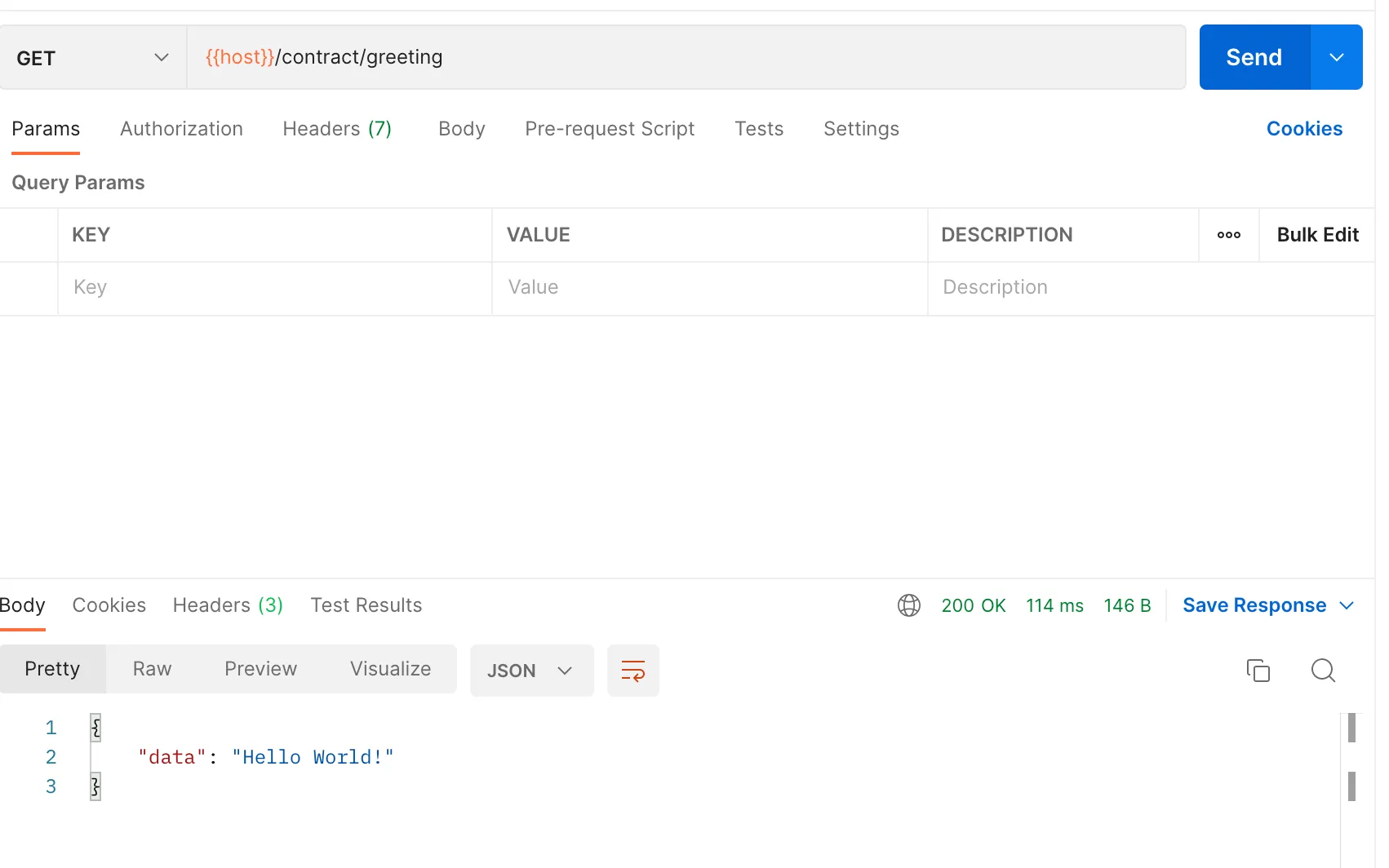
To be honestly, I’m a junior in Golang, and I’m still learning how to use Golang. After coding this backend, I’m getting familiar with it.
Okay, backend part is finished! Next article will introduce how to interact with contract with frontend.
